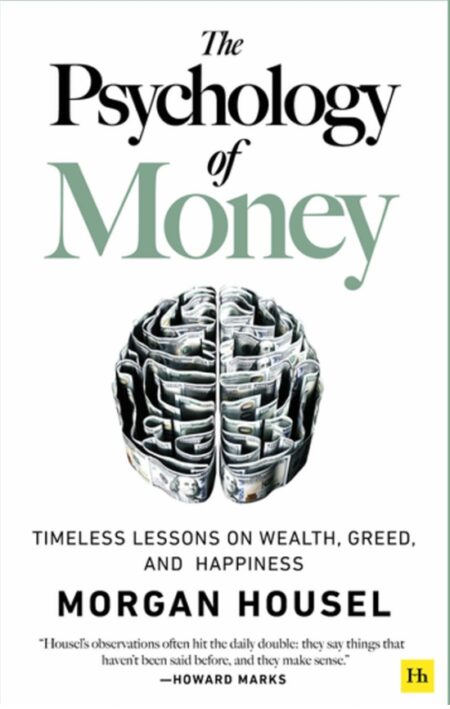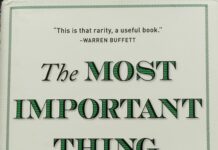I recently reread The Psychology of Money by Morgan Housel and decided to take a couple of notes and share them with you.
The book is also featured in my list of the best financial literacy books for beginners.
So, without further ado, let’s go through the 11 key lessons from The Psychology of Money.
Lesson 1: Mind Over Numbers
The main message of the book is that being financially successful is all about how you behave, not how smart you are.
We tend to think that you need to be incredibly smart or have some sort of specialized skills to make it as an investor. Well, you don’t.
What you need is patience, not greed.
In investing, a person with no education can outperform a person with the best education.
Why is this?
Well, one reason might be that investing and personal finance have more to do with psychology than numbers.
Remember to observe and analyze your behaviour as much as your numbers.
Lesson 2: Recognize the Role of Luck & Risk
Making money requires taking risks. There’s no way around it.
Highly successful people usually take a lot of risks. When you take a risk, there’s a chance it doesn’t work.
When we look at people who’ve made fortunes by investing, there’s always some amount of luck involved.
What’s difficult, though, is to pinpoint exactly how much of investing success is due to luck or risk, and how much is pure skill.
Because of this, one should be careful when studying extremely successful people.
There’s most likely a great amount of luck involved, which makes it hard for a normal person to emulate what they’ve done.
It’s better to focus on broad patterns instead of unique individuals.
Lesson 3: Know When You Have Enough
“There is no reason to risk what you have and need for what you don’t have and don’t need.”
Some of the stupidest moves made in the field of finance are due to greed. When you let greed blind you, you might risk everything you have for a relatively small price.
The hardest financial skill is knowing when you have enough. Unfortunately, it’s also one of the hardest.
When it comes to investing, you often grow hungrier the more you eat.
There’s nothing wrong with wanting more.
It’s a problem when you start to risk things like reputation, freedom, family, and happiness just to get more of something you already have plenty of.
Learn to recognize when you have enough.
Lesson 4: Time Over Profits
It’s not the returns, it’s the time you stay invested that makes the difference.
There’s a great point that Housel makes in his book about the famous investor Warren Buffett.
Buffet had, at the time, a net worth of $84.5 billion. What’s even more amazing is that he accumulated about $84.2 billion of that after his 50th birthday.
If Buffett would’ve started on his 30th birthday and stopped when he turned 60, he would’ve made around $11.9 million. And that’s with a 22% annual return.
$11.9 million instead of $8,450 million.
If you wish to achieve financial success as an investor, you need to increase your own time horizon.
Lesson 5: Getting Wealthy and Staying Wealthy Are Two Different Things
If you’re very good at getting wealthy, but very poor at staying wealthy, you’re in trouble.
Accumulating wealth requires a certain amount of risk, optimism, and work. Maintaining wealth, on the other hand, is about taking fewer risks and trying not to mess things up.
In investing, it’s staying invested for a long time that makes all the difference.
Therefore, the number one goal should be to stay in the market as long as possible.
You stay in the game when you don’t take too much debt, don’t panic during bear markets, and maintain a sustainable risk level.
In other words, you need to be both optimistic and a bit fearful of losing your money. There’s no reason to build wealth unless you can stay wealthy.
It’s more important to be financially indestructible than to have big returns.
Lesson 6: Money = Freedom (= Happiness)
The more control you feel you have over your life, the happier you’ll be.
If you can decide how much you want to work, what you want to work on, and when you want to stop working, you can consider yourself a free person.
Money and investing can, at best, grant you just that. The highest dividend money pays is freedom, and that should be the goal in your financial planning.
In other words, money gives you more time, and that is the most valuable commodity of all.
Use money for freedom.
Lesson 6: Wealth vs. Riches
Being rich means, you have a high income. Being wealthy, on the other hand, means you have income that you’ve chosen not to spend.
Wealth is an ever-growing pool of assets that you can choose to spend later on.
Rich people choose to spend their income and have less wealth. Therefore, being rich is often there for all the world to see, while wealth is hidden.
Unfortunately for the rich, people aren’t usually nearly as impressed with their possessions as they themselves are.
Furthermore, the more they spend to impress, the less money they have to spend.
When we think about financial independence or financial freedom, it’s more likely you achieve both as a wealthy person. Being wealthy is about saving, not about your income or investment returns.
Aim to be wealthy, not rich.
Lesson 7: Learn How to Save
Building wealth is more about your savings rate than your income. Saving is also the cornerstone of personal finance.
When you save more, you lower your expense rate and have more money to invest.
This gives you an edge over investors who may have better return rates but higher expenses and more lavish lifestyles.
The thing about saving is that you don’t necessarily need a specific reason, like buying a house or a car, for it.
Saving itself is a reason enough.
What saving gives you is the freedom of choice. When you have enough money in the bank, you have more freedom to change careers or work a little less.
Having control over your time and options is the most valuable currency there is.
Lesson 8: People Are Not Rational nor Should They Be
What works on paper doesn’t necessarily work in real life.
While some investment strategies might be theoretically and mathematically rational, it doesn’t mean they’re in any way reasonable in practice.
Also, for some reason, investors strive to be completely rational beings and avoid falling in love with their stocks at all costs.
Is it really such a bad thing to love your stocks?
Let’s imagine you own a great company for 30 years. There are a lot of ups and downs during that time.
If you didn’t really care about the company, you’d probably sell it during the first bad period, thus forfeiting all possible future profits.
Sometimes it’s best to go with an investment strategy that gives you relaxed sleep and occasionally love your stocks a little bit.
Strive to be reasonable instead of rational.
Lesson 9: You Have Multiple Lives
People constantly change throughout their lives.
What we want in our twenties can be severely different than what we want in our forties.
Because the key to success is consistency, it’s best to keep most of your options open in case you have different priorities later on.
When it comes to finance, it’s best to avoid the extreme ends in your financial decisions.
Whether you feel like you want to work endless hours in an office or work very little and get by with less, you should account for the possibility that your priorities might change.
It’s important to accept that we can and probably will change our minds at any moment.
Avoid extremities. Those are most likely the things you’ll regret the most.
Lesson 10: Pay the Price
“Like everything else worthwhile, successful investing demands a price”
Investing is the best way to get high returns for your capital.
Unfortunately, you need to pay a price for your success. That price is volatility, uncertainty, and fear.
Many beginner investors find the price too high and end up selling their holdings at a loss.
It’s all a matter of perspective. If you think that the stock market is punishing you when your portfolio takes a dive, then the price feels high and unfair indeed.
Then again, you might consider the short-term volatility being what it is: a necessary price to pay for higher returns. It’s a lot easier to handle because it feels like a fair trade.
Also, volatility itself doesn’t really matter if you’re a long-term investor. It’s your reaction that makes it harmful if you tend to panic and sell when the stocks are down.
If you wish to be a successful investor, you must be willing to pay the price.
Lesson 11: We Play Different Games
“Beware taking financial cues from people playing a different game than you are.”
I’ve talked about this multiple times in different posts, and here we go once again.
Comparing yourself to other investors can be the ruin of your financial life.
If I look back at all the times I felt insecure about my investments, they were times when I compared my portfolio returns to other investors.
The problem with comparing yourself to others is the fact that it’s a bit insane, frankly.
A long-term investor who holds his stocks for 30 years gains nothing from comparing his portfolio to a day trader’s, who sells his stocks in a matter of hours.
The same goes with all the “buy this or that stock” recommendations. People who give the recommendations have no idea whether you’re going to hold the stock for a decade or an hour.
Focus on your own game and don’t compare yourself to others.
Summary
Okay, so let’s wrap up all we’ve learned from The Psychology of Money.
- Stay understanding and humble.
- Understand the role of luck and risk.
- Don’t spend money to impress, save your money and create wealth.
- Be reasonable, not coldly rational.
- Increase your time horizon, the longer the better.
- Accept the uncertainty in investing, past success doesn’t guarantee future success.
- Use your money to buy you freedom.
- Learn to save money for the sake of saving.
- Accept and understand the cost of investing and pay the price.
- Avoid extremities.
- Know what kind of a game you’re playing.




